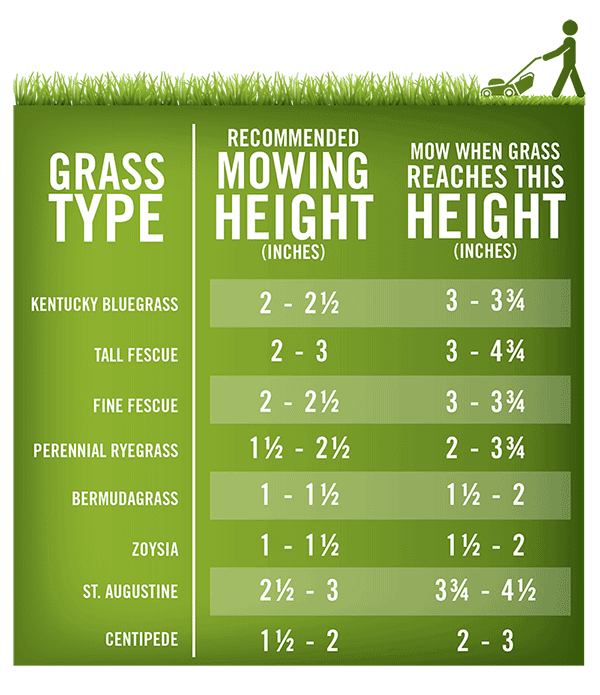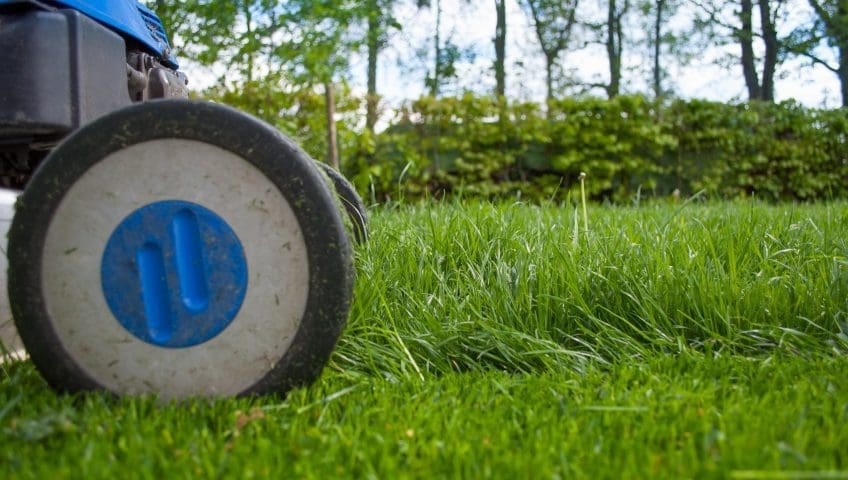Is Weekly Mowing the Ideal Schedule?
A common question homeowners ask is, “How often should I mow my grass?” The answer is more nuanced than one might think. Ideally, mowing should align with the lawn’s growth rate, which can fluctuate depending on various factors such as the time of year, lawn health, fertilization schedules, and environmental conditions. For example, during the spring, when temperatures are rising, rain is abundant, and fertilizer is applied, lawns can experience rapid growth. During such periods, mowing may need to occur weekly or even twice per week. However, during drought, heat stress, or dormant season, mowing may only be necessary every two weeks or even less frequently in extreme cases (University of California Agriculture and Natural Resources, 2022).
The 1/3 Rule: Key to Lawn Health
 One essential guideline for mowing is to avoid cutting more than one-third of the grass blade at each mowing session. Removing more than this can shock the grass, causing stunted growth and increasing susceptibility to pests and diseases. According to the University of Minnesota Extension (2023), following this rule promotes a healthier lawn by maintaining an optimal grass height and ensuring better root development. For instance, if the ideal height for your grass is 3 inches, and after a week, it has grown to 4 inches, you can safely trim it back to 3 inches without causing harm. However, if you skip mowing for a couple of weeks and the grass grows to 6 inches, cutting it back to 3 inches would remove 50% of the blade, which can stress the grass and stunt its growth.
One essential guideline for mowing is to avoid cutting more than one-third of the grass blade at each mowing session. Removing more than this can shock the grass, causing stunted growth and increasing susceptibility to pests and diseases. According to the University of Minnesota Extension (2023), following this rule promotes a healthier lawn by maintaining an optimal grass height and ensuring better root development. For instance, if the ideal height for your grass is 3 inches, and after a week, it has grown to 4 inches, you can safely trim it back to 3 inches without causing harm. However, if you skip mowing for a couple of weeks and the grass grows to 6 inches, cutting it back to 3 inches would remove 50% of the blade, which can stress the grass and stunt its growth.
Additional Issues to Consider
Maintaining an appropriate mowing schedule not only benefits your lawn aesthetically but also prevents a host of other problems:
- Blocked Sunlight and Airflow: Grass that becomes too long can block sunlight and limit airflow to the soil. These conditions create a favorable environment for fungi and pests, which can harm the lawn (North Carolina State University, 2022).
- Clumping: Overgrown grass often clumps when mowed, leaving piles of cut grass that suffocate the healthy grass underneath. If not removed promptly, these clumps can also attract pests and diseases (Pennsylvania State University, 2021).
- Mulching Efficiency: Longer grass is more challenging for mowers to mulch finely. This leads to slower decomposition and can result in thatch buildup, which affects soil health and prevents nutrients from reaching the roots (Michigan State University, 2022).
- Increased Weed Growth: Weeds can overgrow between mowing sessions, especially during peak growing seasons. Longer intervals between mowing give weeds more time to establish and spread, increasing weed pressure in your lawn (University of California Agriculture and Natural Resources, 2022).
Does Bi-Weekly Mowing Really Save Money?
Many homeowners assume that bi-weekly mowing can save them money compared to a weekly mowing schedule. While it may appear to reduce costs, bi-weekly mowing can be more expensive in the long run. Most professional lawn care services charge more for bi-weekly mowing than for weekly mowing due to the added labor and wear on equipment required to handle overgrown lawns. According to Purdue University Extension (2023), overgrown grass is more challenging to mow, requiring additional passes and increased wear on mowing equipment. Additionally, longer grass can damage the lawn, leading to increased costs for fertilizers, herbicides, and labor down the road. By adhering to a weekly mowing schedule, homeowners can avoid these extra expenses and maintain a healthier, more resilient lawn.
The Benefits of Weekly Mowing
Weekly mowing helps maintain a consistent grass height, ensuring healthier growth and reducing the risk of damage. Regular mowing promotes thicker grass, which helps choke out weeds, improves soil structure, and enhances the overall aesthetic appeal of the lawn. Furthermore, lawn care services are more likely to skip a mowing session if necessary during slower growth periods, providing flexibility without compromising lawn health. Skipping a mow is far easier when a client is on a weekly schedule, as bi-weekly clients may experience rapid growth, making scheduling challenging during peak growth periods (North Carolina State University, 2022).
A Weekly Mowing Plan is the Best Option
For homeowners who mow their own lawns, adhering to the 1/3 rule and mowing based on the grass’s growth rate is crucial for maintaining lawn health. For those hiring a lawn service, weekly mowing is generally the best option. It provides the flexibility to adjust to varying growth rates and ensures a healthier lawn over time. Weekly mowing services also offer better value, as they help prevent the need for costly lawn repairs caused by overgrown grass. At Barefoot Lawn Care, we offer weekly mowing to ensure your lawn remains healthy and vibrant. Contact Barefoot Lawn Care today to learn more about our services and how we can help you achieve the perfect lawn.
References
Michigan State University Extension. (2022). Grass clippings and lawn care: What you need to know.
North Carolina State University Extension. (2022). Managing lawns for optimal health and aesthetics.
Pennsylvania State University Extension. (2021). Lawn care basics: Maintaining a healthy lawn.
Purdue University Extension. (2023). Lawn care practices: Weekly vs. bi-weekly mowing.
University of California Agriculture and Natural Resources. (2022). Mowing strategies for healthy lawns.
University of Minnesota Extension. (2023). Mowing your lawn: The 1/3 rule for grass health.

